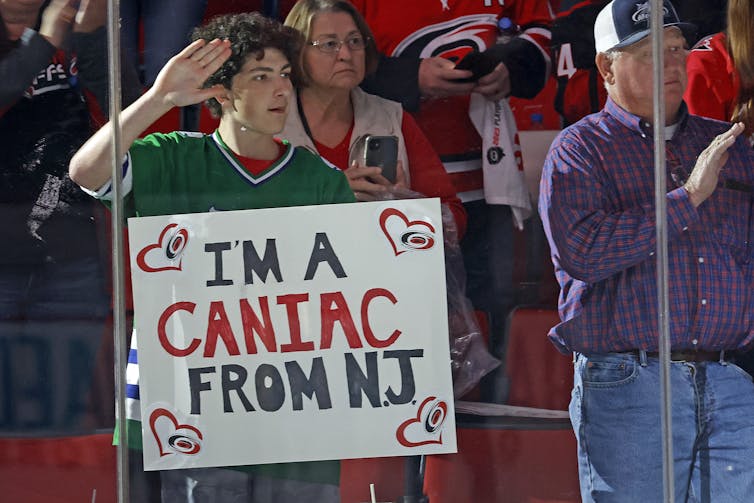
As the Toronto Maple Leafs recently limped to a third straight defeat to the Florida Panthers, Leafs fans experienced the dreaded rat trick. In this ritual, Panthers fans throw plastic rats onto the ice to summon the energy of past, unexpected successes.
A group of extraterrestrials watching this event might be puzzled to see hundreds of otherwise normal people hurling mass-produced rodents at a few dozen tired men with unkempt facial hair. If, as sport fans, we set our past experiences to the side, these superstitions that are so pervasive in sport — especially when the games carry the most weight — really make very little objective sense.
As an ardent sport fan for most of my life — and someone who may or may not have participated in fan rituals — I’m in no position to judge. And although I am not a particularly superstitious person overall, I’ve engaged in my fair share of sport-related irrationality as both a participant and a spectator.
For much of my early life, I saw sport superstition as part of fandom. I have now been studying sport fans for about 15 years, and if I’ve learned one thing, it’s this: rationality and objectivity generally do not apply in sports fandom.
Read more: Leafs and Oilers in the NHL playoffs: Can I cheer on a team I usually hate?
The superstitious athlete
Although all sports have their share of superstitious participants, hockey players have certainly earned their reputation for being at the high end of the range.
As I alluded to earlier, playoff beards become ubiquitous among players at this time of year. This seemingly age-old tradition only dates back to the early 1980s, but has become ingrained in hockey culture among amateurs and professionals alike.
Baseball players are certainly not to be outdone as a superstitious group — for example, it’s taboo to talk about a no-hitter. In the 1989 movie Major League, the Cuban baseball player Pedro Cerrano (played by Dennis Haysbert) used supernatural means to magic his bat. As contrived as the character might have appeared to the average person, most baseball fans would believe that such a player could (and probably does) exist.
For some athletes, superstitions aren’t just meaningless, irrational behaviours; they can have positive effects on mental state and performance. Superstitions can boost confidence and sense of control, as well as reduce anxiety — really, it’s the routine that prepares the body and mind for the performance, rather than the specific behaviour itself.
Superstitions may not be as readily prescribed by sport psychologists as meditation or visualization, but for some athletes, they can serve a similar purpose.
Fan superstitions
Like athletes, fans also tend to exhibit numerous superstitious behaviours both at the game and in other locations, either before or during the game. These superstitions can be group-based — like the rat trick — or personal.
Some of the most common personal behaviours include wearing certain articles of clothing (special underwear and socks are particularly popular), sitting in a particular place and eating or drinking specific foods.
But if we can understand why athletes succumb to superstition based on actual benefits, how can we justify these behaviours among fans? They have no direct involvement in the game. Well, the benefits for fans are not actually that different from those for athletes.
Handling uncertainty
In general, humans don’t handle uncertainty very well. We crave order in our lives, and fundamentally need to explain the underlying causes of important events or outcomes.
In the absence of concrete answers, we start to make up explanations of our own — these are known as attributions. We especially tend to attribute sporting success to factors that are under our control, like player and coach performance or fan involvement. And we attribute failure to things beyond our control, such as the other team’s performance, referees’ actions or fate.
Superstitions help us feel like we have some control over the uncontrollable. There have only been a handful of academic studies on fan superstition, but the findings tend to be consistent. By engaging in superstitions, fans feel as if they’re doing their part to help the team.

When the team wins, being involved generates an even more positive mood, likely due to the perceived satisfaction of helping the team. On the other hand, carrying out the appropriate superstitions can have positive effects on mood even after a loss, possibly because the fan feels as though they did everything they could to help the team. Superstitions can also reduce the stress associated with watching a game among avid fans.
It’s worth pointing out that “fair-weather fans,” who only support the team when it’s doing well, generally aren’t doing this stuff — the team has to be very important to us in order for us to be compelled to engage in superstitions.
Academic research refers to these passionate supporters as “highly identified fans,” because the fan role is a central and important part of that person’s identity and self-concept. As such, their sport fandom is closely tied to their self-esteem, which is why watching sports is such a heavily invested, emotional experience for these highly identified fans (myself included).
Spectator sport is one of the most unpredictable things in the world, so we have a desire to combat this uncertainty and control what’s happening by any means possible, rational or otherwise.
During playoff time, be kind
Sport superstitions make very little sense to non-sport fans, because they haven’t experienced the intensity of emotions and mental gymnastics that come with being a highly identified fan.
It’s more than a pastime, it’s a big part of who we are and how we see ourselves.
And to anyone who couldn’t care less about the playoffs, please just indulge the sport fans in your life and let them do whatever it is that makes them feel better at this time of year. That includes you, Mrs. Eddy.
Terry Eddy does not work for, consult, own shares in or receive funding from any company or organisation that would benefit from this article, and has disclosed no relevant affiliations beyond their academic appointment.
This article was originally published on The Conversation. Read the original article.







